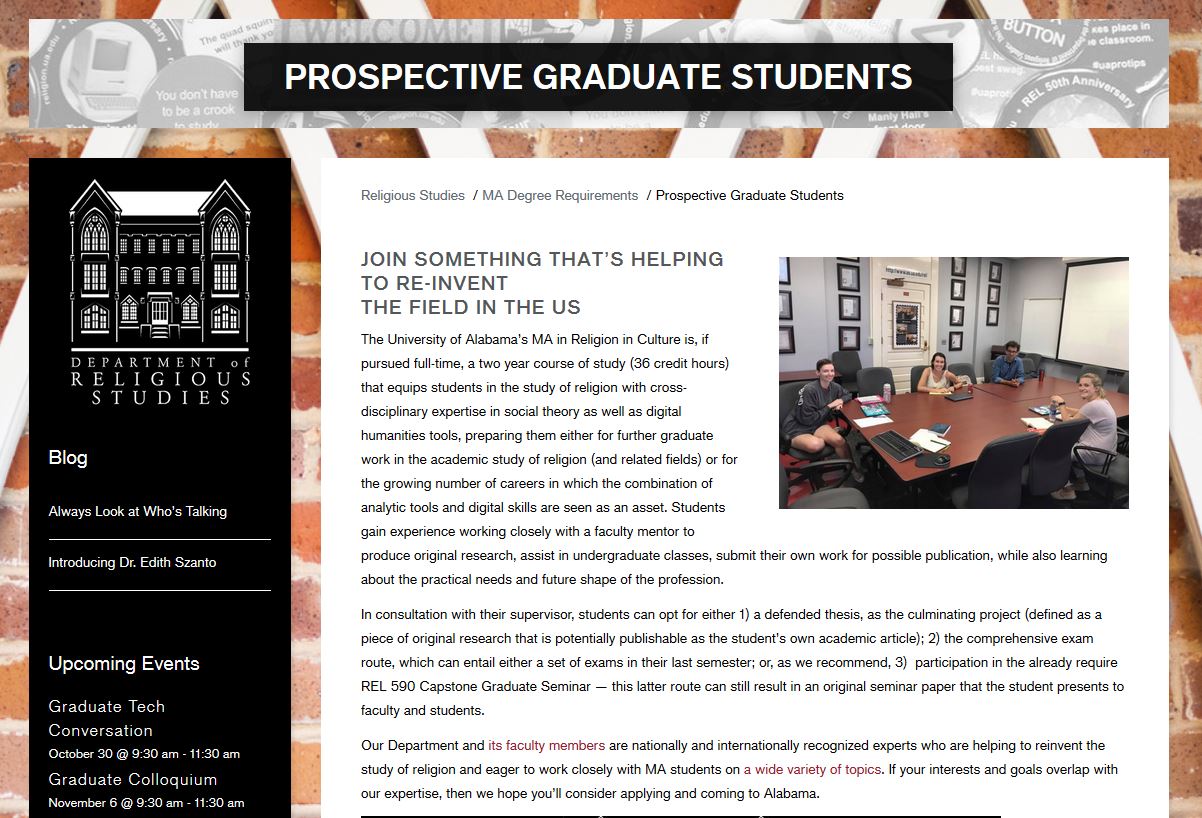It’s that time again, when people are considering applying to graduate programs for the coming academic year. Later in the Fall semester our Graduate Committee will begin making acceptance decisions and will be nominating some of the newly admitted students for competitive, campus-wide fellowships, to help them fund their studies, not to mention making decisions about who will hold the Department’s graduate teaching assistantships. So I thought it was a good time to say a few things about why you might consider studying religion at the University of Alabama.
When we designed our two-year Masters degree (which launched in the Fall of 2017), we aimed to devise a novel degree that would serve two possibly different constituencies: those interested in eventually pursuing a Ph.D. and those wanting a liberal arts Masters degree whose skills could assist them in succeeding in any number of futures well outside academia. The graduate program that resulted immerses students, from their first semester, in the tools of modern social theory along with the skills grouped together as the Digital Humanities (by means of two required Foundations courses). Our hope is not only that students understand the gain of using social theory to study religion as an aspect of culture and history (thereby seeing it as an element of wider systems by which identities and groups are made, remade, and, yes, contested) but that they also quickly see how knowing something about big data analysis, editing video and audio files, making and managing websites and blogs, etc., can come in handy as a scholar or as someone working in almost any other career today — whether using these skills to generate new knowledge or to convey these findings to wider audiences.
And, with an 11-person graduate faculty, with expertise from India, the Middle East, and North America to ancient Greece, Europe, and modern pop culture, there’s a pretty good chance that someone here will overlap enough with a student’s interests to be able to meet them where they are but then help move them to somewhere new. Adding to this the possible internships students can tackle as part of their degree, to gain practical experience in a variety of fields, as well as the chance to earn a Museum Studies certificate, and you arrive at a program that’s easily adapted to each student’s needs.
We’ve been lucky enough to fund all students so far admitted to our MA program, but these decisions are always made on an annual basis. Moreover, we’ve been very successful with some of our students receiving campus-wide awards, with 7 of our initial 13 full-time students being awarded one of these competitive Fellowships (entailing a full-stipend as an outright award, a tuition waiver, and health insurance). And while those holding a TA position gain experience in the classroom each Fall and Spring semester, it’s always done working closely with their supervisor and never with the student on their own as the professor-of-record. And during the summer there’s an opportunity for MA students to earn income as part of the supervised team teaching online courses.
Although the program is not yet very old, our graduates have already confirmed that our aim to serve the needs of students with a variety of interests and different hopes for their futures works (learn more about what they’re doing). So we hope you’ll consider learning more and maybe even applying.
If you’re interested in more information, visit the Prospective Students page on our website or contact Prof. Merinda Simmons, our Graduate Director.
